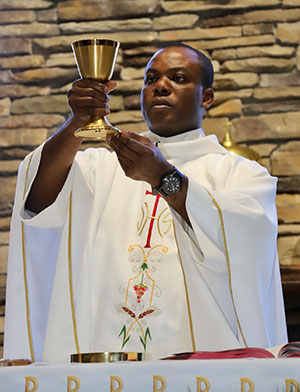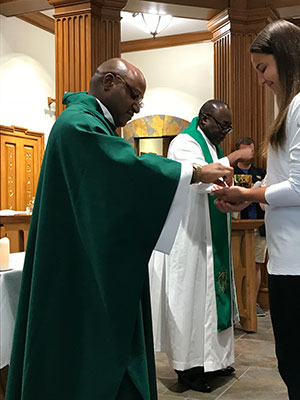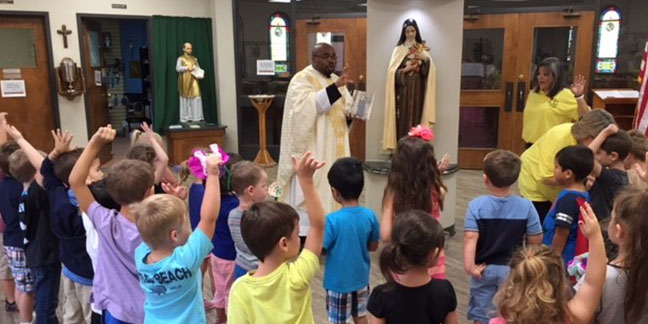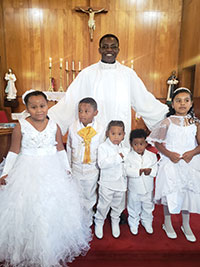The Diocese of Charlotte is blessed with 11 priests who each traveled more than 5,700 miles from their homes on the African continent to minister to the People of God in western North Carolina. Some serve as pastors or parochial vicars.
Some serve in Catholic campus ministry. All were inspired by missionary priests to become missionaries themselves – bringing the Gospel message from the developing world back to the developed world. Here are some of their stories:
FATHER AMBROSE AKINWANDE, MSP
 Father Ambrose grew up in Nigeria, the oldest of four children. Growing up was exciting for him and his siblings, he says, because his parents provided the family with a loving home and nurtured their education.
Father Ambrose grew up in Nigeria, the oldest of four children. Growing up was exciting for him and his siblings, he says, because his parents provided the family with a loving home and nurtured their education.
“Schooling is an important aspect of our lives in Nigeria, because it is a gift that parents could give to their children,” he explains. “We have this saying that ‘people could take away your houses, cars and other material things, but they cannot take away your knowledge – it is yours forever.’”
Father Ambrose attended a co-ed school, which gave him a better appreciation of the role of laypeople in the Church, particularly women. “It was within this wonderful experience I was able to reflect and make that decision to go to the seminary,” he explains.
He entered the Missionary Society of Saint Paul’s seminary in 1997 at the age of 21.
“I was led to the seminary by a strong desire to do something with the talents that God had given me – a desire to serve the people of God and not only my native people.”
He studied philosophy and theology and was ordained on June 23, 2007. He served in Nigeria for five years after his ordination. On Aug. 16, 2012, he arrived in the U.S. in the Missionary Society of Saint Paul’s regional house in Houston, Texas, then came to the Diocese of Charlotte.
His first assignment in America was as a parochial vicar of St. Matthew Church in Charlotte – the largest Catholic parish in the U.S. – where he served for three years. “It was a huge experience for me. Thank God, I survived it,” he jokes.
In January 2016 he was assigned as pastor of Our Lady of the Rosary Church in Lexington.
“I have been in the U.S. about six years now. So far it has been so wonderful. It is a beautiful country. I hope Americans know it is a beautiful country.”
Father Ambrose says he is impressed by the faithfulness of the people of the Charlotte diocese.
“I serve with so many beautiful Catholics who are always ready to serve the Lord in different ways. In spite of the priest scandal in the Church, Catholics still love their priests. That is my joy. Their love and care help me in my ministry.”
His greatest challenge? Preaching the Gospel with sincerity and honesty while not getting caught up in the political divisiveness of the day.
“Many of the moral issues that the Church is trying help people with have become political packages or platforms for politicians. To challenge people on moral issues like abortion, homosexuality and other issues means one is taking sides with one political party. I always tell my audience that if it becomes very, very difficult to preach the Gospel here in the United States, I will return back to Nigeria or other countries that are receptive to the Gospel of Christ,” he says.
FATHER MARCEL AMADI
 Father Marcel Amadi was born and raised in Lagos State, Nigeria. He is the third child from a family with six children. He attended a boarding high school, St. Theresa’s Minor Seminary, and All Saints Major Seminary.
Father Marcel Amadi was born and raised in Lagos State, Nigeria. He is the third child from a family with six children. He attended a boarding high school, St. Theresa’s Minor Seminary, and All Saints Major Seminary.
“I consider myself very privileged to have been influenced by some Irish priests and brothers while in the minor seminary, and my pastor of several years, while (I was) growing up, is a Dominican from Chicago,” Father Marcel explains.
“All of those great men of God had positive impacts on me and facilitated my decision to become a priest even from the age of 8, right after my first Holy Communion, when I became an altar server,” he recalls.
He wanted to become a priest so much that he would play priest as a child, “celebrating” Mass with orange soda and a small round biscuit in front of a “congregation” of his friends and siblings.
“That dream turned to reality when I was ordained a priest for the Catholic Archdiocese of Lagos on Nov. 15, 2003,” Father Marcel says.
Shortly after his ordination he worked as an assistant priest in a parish for a little over a year and later was appointed the cardinal’s secretary as well as archdiocesan secretary and master of ceremony.
“Those seven years were quite busy, tough, challenging, interesting and exciting,” he recalls. “All to the glory of God.”
In the U.S., Father Marcel first served in the Archdiocese of New York before coming to the Charlotte diocese. While in New York, he completed graduate studies at Fordham University.
“The quest for further studies and change of environment led to my search and discovery of the Charlotte diocese through the connection of Father Ambrose Akinwande, and the approval of my archbishop.”
“It’s an honor for me to serve in the U.S. because I see myself as giving back what the missionaries to Nigeria brought to us many years ago,” he says. In fact, his former Dominican pastor from Chicago, who served 57 years in Nigeria, was the person who recommended him to the seminary.
“Because of such priests and many other Irish priests whom I encountered while growing up, it gives me utmost joy to serve the land that once served me through their servant and sons.”
The fact that the Charlotte diocese is one of the fastest growing dioceses in the U.S. gladdens his heart. “I’m very honored and grateful to God to be part of this epochal history.”
Father Marcel now serves the diocese in campus ministry at Bennett College, North Carolina A&T University, Salem College and Wake Forest University. He says this ministry is dear to his heart but has its challenges.
“Getting around numerous campuses sometimes can actually lead to lots of wear and tear, not just on the car but on the body as well,” he says with a smile. “But I never regret doing what I do for and with the students. Having experienced God’s love as a small boy and through the years, I’m so happy to be among university students today, spreading that love and faith. The students are my joy, my hope, my happiness!”
FATHER PAUL ASOH, MSP
 One of the Charlotte diocese’s newest arrivals is Father Paul Asoh, also from the Missionary Society of St. Paul. He is the third child in a family with six children. He studied at St. Theresa’s Minor Seminary boarding high school, just as Father Amadi did, and then spent nine years at the Missionary Society of St. Paul of Nigeria Major Seminary after joining the order, studying philosophy and theology.
One of the Charlotte diocese’s newest arrivals is Father Paul Asoh, also from the Missionary Society of St. Paul. He is the third child in a family with six children. He studied at St. Theresa’s Minor Seminary boarding high school, just as Father Amadi did, and then spent nine years at the Missionary Society of St. Paul of Nigeria Major Seminary after joining the order, studying philosophy and theology.
Father Paul worked for 14 years in the Missionary Society of St. Paul’s formation house and seminary. Three of those years, he served “on loan” to the St. Patrick’s Theology House in Kenya.
Then, he recalls, “it was God’s time for me to begin pastoral parish ministry.”
A grueling 32-hour flight brought him to the United States, where he received orientation at the Missionary Society of Saint Paul’s regional house in Houston. Another – thankfully shorter – flight brought him to Charlotte this past summer, where he dove in to his new assignment as parochial vicar of St. Therese Church in Mooresville.
“I was first inspired to the priesthood listening to my parish priest in the early 1980s, the late Father Pat Laffey, a St. Patrick’s Irish missionary who had spent decades working in Nigeria. I loved his children’s Mass on Sundays and his style of asking us kids questions during his homilies, for which we got little gifts if we answered correctly,” Father Paul recalls.
He describes himself as “a bit of a difficult child,” which led his parents to seek the advice of a wise old woman in their parish. She encouraged them to send him to St. Theresa’s Minor Seminary so that he might be reformed.
“Hence, at 10 years old, I remember telling my dad that I would agree to go to the minor seminary but had no intention of becoming a priest. Like the biblical Jonah who was running away from God, I did everything possible to get expelled, but my rector/principal just would not do it when he discovered that that was my goal.
“In my fourth year in Catholic school, at the height of my juvenile escapades, God found me through a conversion experience and I had no choice but to open my heart to Him and promise that I was going to help bring others like myself to Him.”
As a Catholic missionary, Father Paul has lived and ministered on three different continents: Africa, Europe and America.
“In each place I have benefited from their cultural, religious and human wealth of experience. I find Mooresville to be a picturesque environment with Lake Norman and a close-knit, large community.”
Father Paul says he enjoys the great spirit of fraternity and support among the priests and people of God in the Charlotte diocese. As far as coming to live in the U.S., he adds that “learning to drive again in a new country with detailed signs and enforcement, but with better roads, and doing my best to learn Spanish have both been a challenge and an opportunity.”
FATHER HENRY TUTUWAN Father Henry Tutuwan hails from Cameroon in West Africa. He is the third of seven children in his family.
Father Henry Tutuwan hails from Cameroon in West Africa. He is the third of seven children in his family.
“I got my inspiration to the priesthood from a missionary priest when I was still a little boy, about 4 years old,” he says. “As I grew up, my dream kept fluctuating from being a priest to being a military person or a lawyer. Towards the end of elementary school, the pull towards the priesthood became stronger.”
Father Henry attended middle school and high school at the Minor Seminary, Bishop Rogan College. He attended St. Thomas Aquinas Major Seminary in Bambui, Cameroon, and was ordained April 4, 2002, for the Diocese of Buea.
“After a few year of service I felt a strong urge to do missionary work. I prayed and committed it to God's will. After five years God fulfilled His plan for me, making my dream come true – and here I am.”
Father Henry has been in the United States for the past 16 months.
“I think God wanted me to serve in the United States,” he explains. “When I had the strong call to missionary work, there was no particular place in mind. I told the Lord wherever He will lead me I will go. I believe my being here was His will for me through my bishop and the bishop here in Charlotte.”
Father Henry has found the people in the Diocese of Charlotte to be very warm and welcoming with a ready hand to help.
“The bishop is so welcoming and the vicar general/chancellor is so selfless, organized and hard-working. I also enjoy the welcoming company of the priests,” he notes.
Father Henry says he had a bit of culture shock when he first arrived in Charlotte.
“The first challenge was a socio-cultural sting. Back home every rectory has a cook, a housemaid, a laundry person, a night watch, sometimes a driver,” he explains. “You will have people around the parish all the time. It is completely different here.”
Here, he adds, the parish office staff is much more organized than in Cameroon. “Back home the priest is everything – parishes did not have secretaries, let alone an office manager. (It is) good that my parents trained us to do everything.”
Father Henry has also had to adapt to the food in the United States.
“There is too much of food in the United States, yet finding the combination of ingredients that will give me the home taste is not easy, and also placing an order in a restaurant is not easy,” he says.
However, Father Henry believes that with the help of friends these challenges have become motivation towards his speedy adaptation to the United States.
“I am happy working here,” he asserts. “It is part of God's plan for me and I also see it as a sign of my appreciation to God for the missionaries who brought Christianity to us. To God be the glory.”
— SueAnn Howell, Senior Reporter
Priests from the African continent serving in the diocese
NIGERIA
- Father Ambrose Akinwande: Pastor, Our Lady of the Rosary Church in Lexington
- Father Marcel Amadi: Campus Ministry at Wake Forest University and the Winston-Salem area
- Father Innocent Amasiorah: Campus Ministry at UNCC and the Charlotte area
- Father Paul Asoh: Parochial vicar, St. Therese Church in Mooresville
- Father Casmir Maduakor: Parochial administrator, Our Lady of the Mountains Mission in Highlands and St. Jude Mission in Sapphire
CAMEROON
- Father Moses Njoh: Campus Ministry at High Point University
- Father Felix Nkafu: Parochial vicar, St. Leo Church in Winston-Salem
- Father Peter Nouck: Parochial vicar, Holy Family Church in Clemmons
- Father Basile Sede: Pastor, Our Lady of Consolation Church in Charlotte and St. Helen Mission in Spencer Mountain
- Father Henry Tutuwan: Pastor, St. Benedict the Moor Church in Winston-Salem and Good Shepherd Mission in King
DEMOCRATIC REPUBLIC OF CONGO
- Father Jean Pierre Lhoposo: Pastor, St. James Church in Hamlet and Sacred Heart Mission in Wadesboro
Cardinal Tobin: African priests, religious in U.S. make big contribution
-
Cardinal Tobin: African priests, religious in U.S. make big contribution
ADDIS ABABA, Ethiopia — The presence in the United States of about 3,000 priests and religious from countries in Africa is a great contribution to the U.S., said Cardinal Joseph W. Tobin of Newark, N.J.
That fact “makes me a bit nervous because I hope we are not ‘stealing’ their personnel,” Cardinal Tobin, who chairs the U.S. bishops’ Subcommittee on the Church in Africa, told Catholic News Service during the July 13-23 meeting of the Association of Member Episcopal Conferences in Eastern Africa, known by the acronym AMECEA.
AMECEA, which includes the bishops’ conferences of Eritrea, Ethiopia, Malawi, Kenya, Tanzania, Sudan, South Sudan, Uganda, Zambia, Djibouti and Somalia, held its plenary assembly in the Ethiopian capital, Addis Ababa. The theme of the meeting was “Vibrant Diversity, Equal Dignity, Peaceful Unity in God in the AMECEA Region.”
Cardinal Tobin, who represented the U.S. bishops at the meeting, said that in the study sessions, he was impressed at the bishops’ honesty about their local situations and at their concern for young people, despite the difficulties in translating that concern into action.
“The incredible growth of the African Church is a sign of hope for Americans,” the cardinal said, and its perseverance in very difficult situations show its vibrancy,
The Church in the United States annually commits $2.5 million-$3 million to support the work of the Church in Africa, he said.
— Catholic News Service


